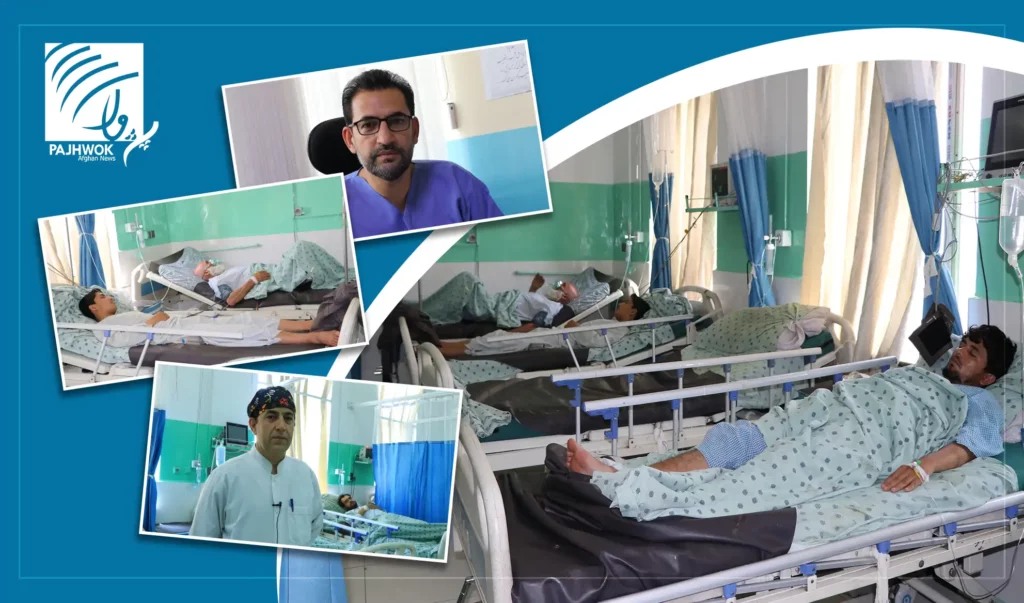KABUL (Pajhwok): Doctors say appendicitis cases have increased in summer and urge people to visit a doctor as soon as possible if they see symptoms such as severe abdomen pain, vomiting and high fever.
The doctors say the weather has warmed and the number of people suffering from appendicitis has also surged. The emergency medical condition sometimes causes a person’s death, so arbitrary treatments should be avoided.
What is appendicitis?
Dr. Mohammad Rafiq Muram, a general surgery specialist at Mohammad Wazir Akbar Khan Hospital in Kabul, told Pajhwok Afghan that appendicitis was an inflammation of the appendix, a finger-shaped pouch that projects from colon on the lower right side of abdomen.
Appendicitis causes pain in lower right abdomen. However, in most people, pain begins around the navel and then moves. As inflammation worsens, appendicitis pain typically increases and eventually becomes severe.
A blockage in the lining of the appendix that results in infection is the likely cause of appendicitis. The bacteria multiply rapidly, causing the appendix to become inflamed, swollen and filled with pus. If not treated promptly, the appendix can rupture.
According to Dr. Muram, severe pain around the navel, lack of appetite, vomiting, diarrhea or constipation, high fever, abdominal swelling, inability to remove stomach gas and inability to defecate are some of the symptoms of the condition.
Dr. Naqibullah Araam, trainer specialist in surgery at Jamhoriat Hospital in Kabul, said: “Appendicitis is the most common cause of acute abdominal pain requiring surgery, but the exact cause is not always clear.”
Araam said sometimes strong proteins such as meat, peas and beans caused the appendicitis to appear, and sometimes a small piece of food, if it enters the appendix duct, blocks it and causes this condition.
Can inflamed appendix be prevented and treated?
Doctors say appendicitis treatment is possible in all hospitals in Afghanistan and the patient should be transferred to a health center as soon as possible.
Dr. Muram said: “Appendicitis cannot be prevented, but it is better to take some points into consideration, such as maintaining good hygiene, drinking more fluids, and eating foods rich in fiber such as fruits and vegetables.”
He asked the people to see a doctor as soon as possible if they see the above-mentioned symptoms, especially the annoying pain around the navel.
He said appendicitis treatment required a simple surgery, but the patient should be transferred to a health center as soon as possible.
He added: “Very important points we should consider include not taking medicine arbitrarily. When painkiller is used, either by ourselves or by non-professional doctors, the pain disappears, but pathology is integral.”
What is the number of people with appendicitis in Afghanistan?
Dr Muram says: “Appendicitis is a common medical condition all over the world, but it differs according to age and season, for example, the incidence of this condition increases in summer because the weather gets hot and body fluids decrease. And eating nutritious protein foods at this time make the ground more favorable for the condition.”
He said they received up to seven patients in 24 hours and recently the number of appendicitis patients in the hospital has increased.
Patients commend services offered in hospital
Abdul Salam, an appendicitis patient in Mohammad Wazir Akbar Khan Hospital, said that he underwent surgery on Saturday and currently his condition had improved.
He added: “Suddenly, I had a very severe stomachache and the right side of my abdomen was hurting to such that it was unbearable. When I came to the hospital, they said it was appendicitis, the doctor operated on me and thankfully I am better.”
He asked people to visit health centers as soon as possible when they felt severe stomachache and avoid self-medication.
At the same time, Milad, a shopkeeper in Aria township in Kabul, who was waiting for his operation, said: “Since yesterday, I have a lot of pain around my navel. At first, I didn’t take it seriously. I thought it was a stomachache, but when I reached hospital, I was told that it is appendicitis.”
sa/ma








GET IN TOUCH
NEWSLETTER
SUGGEST A STORY
PAJHWOK MOBILE APP